Video: Second Olympic chance for Swiss mountain biker Vogel
Teamwork could make the difference in London
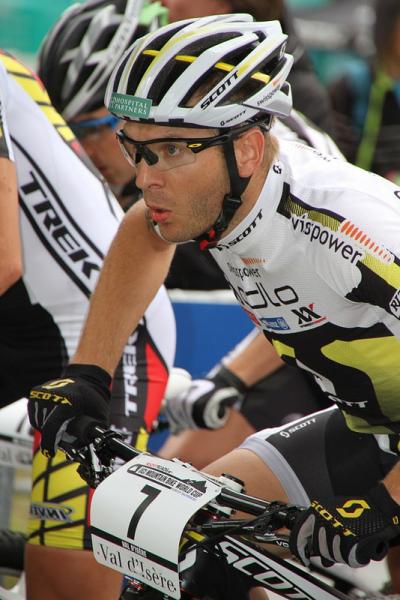
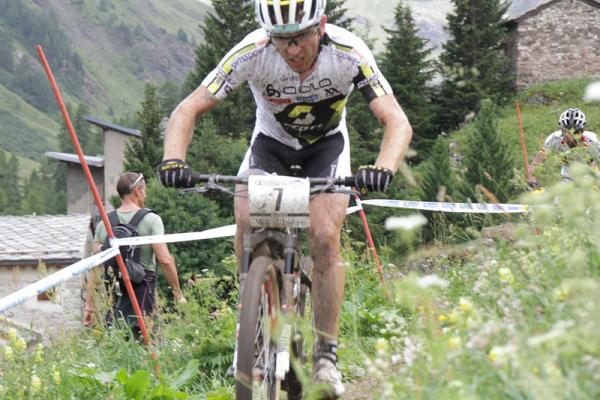
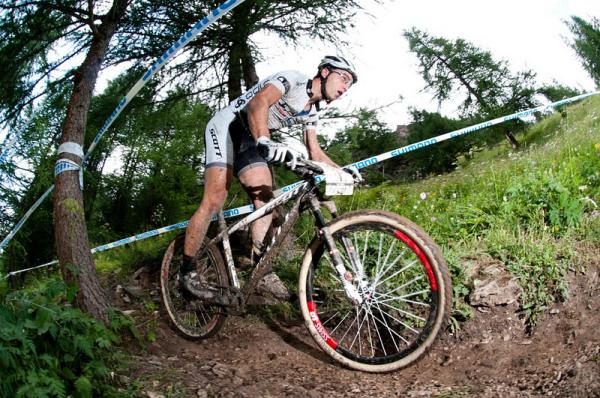
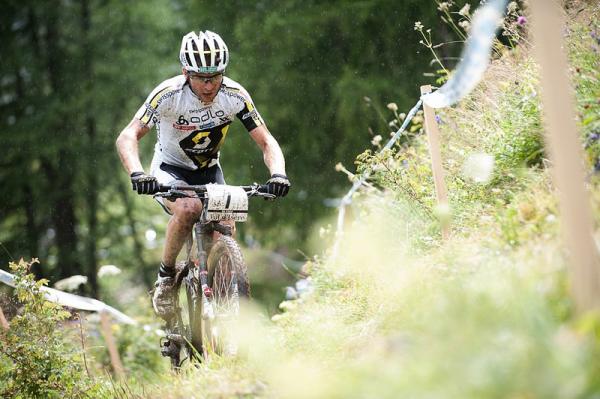
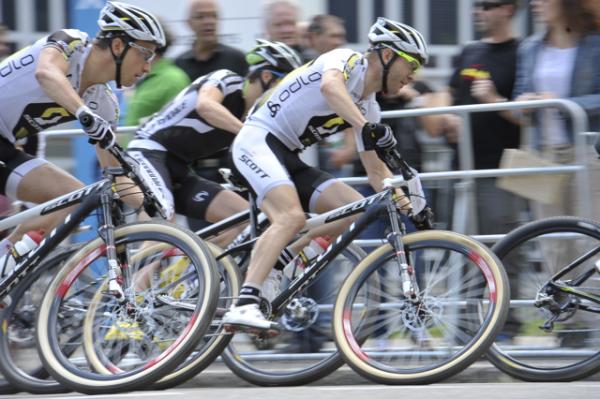
Last time around, the Olympic Games did not go so well for mountain biker Florian Vogel, but the Swiss rider is looking forward to a second chance at Olympic glory in London on August 12, 2012.
In Beijing in 2008, Vogel abandoned the race. Although he had proved his talent and earned his selection prior to the Games by finishing second behind Christoph Sauser at the world championships, on race day in China he overheated. "Sometimes the heat is a bit of a problem for me if I'm not well adapted," said Vogel to Cyclingnews. "So I always need a few more weeks to get used to the heat. Before Beijing, I made some mistakes in my preparation for the race, and I was not well adapted to the heat."
With Switzerland routinely placing as many as five or six riders in the top 10 of World Cups, making the three-man 2012 Swiss Olympic Team was no easy task.
"I focused only on the qualification races this spring and didn't race so much in other competitions," said Vogel, who was the Swiss cross country national champion in 2011.
"The Olympic selections were done after La Bresse [World Cup], which was quite early, so I still had time to take it easy for a few days before starting to rebuild again."
Vogel thinks the 2012 Olympic qualification process was easier than in 2008, when there were more qualifying races and the Worlds happened before the Olympic Games. This year's final qualification race was in La Bresse, France, in late May, giving those selected plenty of time to take a break and then ramp back up their Olympic preparations.
"In the end, the battle [to make the Olympic team] was quite tight because there are a bunch of fast guys in Switzerland as usual, and we only have three spots," said Vogel. "I didn't have the best start due to a mechanical at the first World Cup in Pietermaritzburg, so then I had to start far in the back in [the second round in] Houffalize, which was not helpful to get into the top three spots. But in the end, it worked out."
The latest race content, interviews, features, reviews and expert buying guides, direct to your inbox!
Looking back on his spring campaign overall, Vogel said, "With a bit more luck, I would have had better results. I still have hope I will do better in the next few weeks. It wasn't a bad start to the season; it just wasn't perfect. It was average."
Final Olympic preparation
Vogel is consistent in his preparation for the big races, but this year he made some minor changes to address his past problems racing in the heat.
One change he made was to spend less time at a high altitude training camp in the time prior to the final World Cup held last weekend in Val d'Isere, France. "Up there it's not that hot. It can be 25 degrees (Celsius), but often it's colder and you can get some snow in July. It's nice there for training, but for me, it can be a negative thing if I'm there for too long. This year, I was there for a bit more than a week, for a big block of training."
Since his return from the high altitude training camp, where he trained some with Swiss Olympic teammates Nino Schurter and Ralph Naef, Vogel raced to second at the Swiss national championships and to sixth place in Val d'Isere last weekend.
On Monday, he heads to London for the Olympic Games. He'll have six days to get used to the climate and the course prior to the Olympic race.
The team advantage
Switzerland is a powerhouse cross country mountain bike nation, and when the team lines up in London, it will field the maximum possible three male riders: Vogel, Schurter and Naef.
While Naef rides for the Multivan Merida trade team, Vogel and Schurter are used to riding together as Scott-Swisspower teammates. He is hoping that riding with Schurter, who is one of the favorites for winning the gold medal, will be an advantage.
"Until now, I was not in shape to help Nino a lot. Normally, I was further back than him. I hope this will change by the Olympics," said Vogel. "I'm sure it can be an advantage for both of us if we are together."
"It's not like a road race because there are not that many tactics, but sometimes it can help in small ways. It helps not just mentally. Let's say Nino is attacking... I won't make pace for the others, which is an advantage for him, but also for myself. I can save energy."
Vogel explained how the two have worked together in the past. "It was a tactical race in Canberra [at the world championships in 2009 when Schurter won and Vogel was third] and we both got some benefits there. The Olympics is a different course, but it can be a tactical race there depending on how it unfolds. I hope I'm able to be up in front again."
Vogel noted that the Olympic course is more open than most mountain bike courses and quite windy - two factors likely to make it a tactical race. "Normally, wind doesn't play a big role in mountain biking because it is in the forest or on a course like in Mont-Sainte-Anne [at the World Cup]. In London, it's open and near the coast. There are few or no trees. If someone is in front alone, he may waste some energy."
"It's hard to tell before the race how it will unfold. It's still a mountain bike race and normally the fastest rider wins. That's the nice thing about mountain bike racing. I think it won't be different at the Olympics."
Life after London
At 30 years of age, Vogel figures he has a shot at one more Olympic Games after London. "I hope there will be another Olympics. That's my plan. It won't be easy. There are a lot of fast, young guys coming up."
"The level is always high in Switzerland, and it won't be lower in four years. It will probably be higher. Right now, I'm still having fun, and it's my goal to try to go to Brazil [in 2016], too."
In the nearer-term future, Vogel will travel to Saafelden, Austria to race the world championships in early September. While his focus will be on the main cross country event, he said he will also race the eliminator, which will be part of the Worlds for the first time ever.
"The eliminator is the day after the cross country. I don't know how they will work out the start and how many spots they will have. I used to be fast in that kind of race when I was younger, but the last two or three years, I've not focused on shorter distances and I lost some of my speed maybe. But if I have the opportunity to start, there's no reason not to do it."
Speaking of the new discipline generally, he shared thoughts that have been heard through out the elite mountain bike peloton this season. "The eliminator is a good thing, and if they find a way that you can do both without negatively affecting the cross country, I'll race it more."
Sue George is an editor at Cyclingnews. She coordinates all of the site's mountain bike race coverage and assists with the road, 'cross and track coverage.